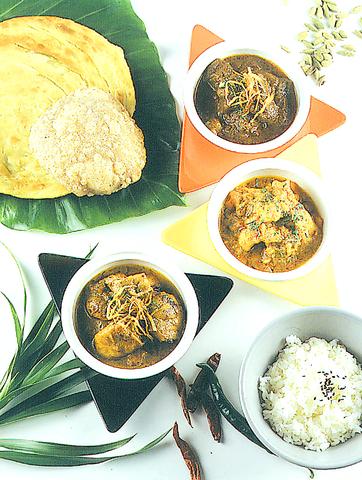Taipei's curry scene has long been dominated by establishments such as Hindustan and Tandoor. Their decor is comfortingly dowdy and there is a definite curry tang in the air when you enter. There is little pretension to elegance, but there wasn't really much choice if you wanted an authentic curry meal.
Now there is Oberoi, which according to Zack Li (
Oberoi has spent heavily on creating a sophisticated modern dining environment, with minimalist black upholstered chairs and spotless white table linen. Tableware shows an eye for presentation, and certainly curry has rarely looked so elegant. "We have incorporated some ideas from western cuisine," Li said, and with its understated garnish, there is always a splash of green or red to give each different curry dish visual appeal.

PHOTO COURTESY OF OBEROI
One great feature of Oberoi is its attention to bringing out the different spices. "Mostly we don't make our curries hot unless customers specifically ask, for that masks the tastes of the different kinds of spices," Li said. "We want each dish to taste different." The mutton rojan josh and the beef bhuna are both highly recommended. The meat is tender (Australian lamb and US prime respectively), and the flavor full without being overwhelming. Portions are not huge but the subtlety of the flavors more than compensate. And to fill up, the variety of baked Indian breads such as naan, poori and the lachha paratha, is a delicious way of filling in the gaps.
For the sweet tooth, check out the phirni oberoi, a light rice pudding flavored with anise, or the more conventional Indian ice cream.
Oberoi offers a wide variety of meat curries and three vegetarian dishes, but with a couple of days notice, Li said that the restaurant's chefs can turn out a vegetarian feast. "We can't do it on the day, as most of our food needs extended preparation times. Oberoi's chefs are drawn from five-star hotels in India, and Li said that he wants to maintain that kind of standard both in the kitchen and in the dining area. "We probably have the cleanest and most modern kitchen of any Indian restaurant in Taiwan," he said.
The restaurant offers a range of set menus for between NT$270 and NT$360 and serves a wider a la carte menu for dinner. The drinks menu covers most basic cocktails and spirits and a good selection of beers, including Kingfisher for those who want Indian beer. Finally there is a place to eat Indian in style.

April 28 to May 4 During the Japanese colonial era, a city’s “first” high school typically served Japanese students, while Taiwanese attended the “second” high school. Only in Taichung was this reversed. That’s because when Taichung First High School opened its doors on May 1, 1915 to serve Taiwanese students who were previously barred from secondary education, it was the only high school in town. Former principal Hideo Azukisawa threatened to quit when the government in 1922 attempted to transfer the “first” designation to a new local high school for Japanese students, leading to this unusual situation. Prior to the Taichung First

The Ministry of Education last month proposed a nationwide ban on mobile devices in schools, aiming to curb concerns over student phone addiction. Under the revised regulation, which will take effect in August, teachers and schools will be required to collect mobile devices — including phones, laptops and wearables devices — for safekeeping during school hours, unless they are being used for educational purposes. For Chang Fong-ching (張鳳琴), the ban will have a positive impact. “It’s a good move,” says the professor in the department of

On April 17, Chinese Nationalist Party (KMT) Chairman Eric Chu (朱立倫) launched a bold campaign to revive and revitalize the KMT base by calling for an impromptu rally at the Taipei prosecutor’s offices to protest recent arrests of KMT recall campaigners over allegations of forgery and fraud involving signatures of dead voters. The protest had no time to apply for permits and was illegal, but that played into the sense of opposition grievance at alleged weaponization of the judiciary by the Democratic Progressive Party (DPP) to “annihilate” the opposition parties. Blamed for faltering recall campaigns and faced with a KMT chair

Article 2 of the Additional Articles of the Constitution of the Republic of China (中華民國憲法增修條文) stipulates that upon a vote of no confidence in the premier, the president can dissolve the legislature within 10 days. If the legislature is dissolved, a new legislative election must be held within 60 days, and the legislators’ terms will then be reckoned from that election. Two weeks ago Taipei Mayor Chiang Wan-an (蔣萬安) of the Chinese Nationalist Party (KMT) proposed that the legislature hold a vote of no confidence in the premier and dare the president to dissolve the legislature. The legislature is currently controlled